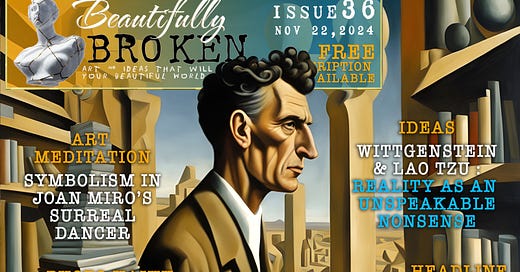Beautifully Broken Issue #36: Wittgenstein, Lao Tzu: Reality As Unspeakable Nonsense
IDEAS, ART & WISDOM TO REPAIR OUR BEAUTIFUL WORLD
Happy Saturday! Welcome to Beautifully Broken Issue #36: WITTGENSTEIN & LAO TZU: Reality As An Unspeakable Nonsense
SCHEDULED PAUSE: Every 10 issues or so I take a week or two to recharge and manage the deadlines for other projects that are pressing. I’ll be doing that after this issue and will see you again on the 8th of December for Issue 37.
Note: Each week's issue will be reserved for paid subscribers first (but you can obtain a free preview of an issue as a free subscriber). After a month the issue will become free and can be found in the archive.
IDEAS: WITTGENSTEIN & LAO TZU: Reality As An Unspeakable Nonsense
In his preface to the Tractatus Wittgenstein states that the question of nonsense has to do with drawing the limits of language. Nonsensical expressions go beyond the limits of meaningful language (words and thoughts that describe things and their interactions) and reside "on the other side" of what can be said. Yet, at the end of the book he declares that his own propositions are, strictly speaking, nonsensical.
Ludwig Josef Johann Wittgenstein Austrian German: (1889–1951) was an Austrian philosopher who worked primarily in logic, the philosophy of mathematics, the philosophy of mind, and the philosophy of language.
From 1929 to 1947, Wittgenstein taught at the University of Cambridge. Despite his position, only one book of his philosophy was published during his entire life: the 75-page Tractatus Logico-Philosophicus (1929).
Tractatus Logico-Philosophicus had a broad goal: to identify the relationship between language and reality, and to define the limits of science.
There are seven main propositions in the text. These are:
The world is everything that is the case.
What is the case (a fact) is the existence of states of affairs.
A logical picture of facts is a thought.
A thought is a proposition with a sense.
A proposition is a truth-function of elementary propositions. (An elementary proposition is a truth-function of itself.)
The general form of a proposition is the general form of a truth function
Whereof one cannot speak, thereof one must be silent.
Wittgenstein posits that language can describe facts about the world, but it cannot address deeper, ultimate truths about existence, ethics, feelings or the mystical. Hence “Whereof one cannot speak, thereof one must be silent.”
Lao Tzu also romanized as Laozi is a semi-legendary ancient Chinese philosopher and author of the Tao Te Ching, the foundational text of Taoism. Lao Tzu is a Chinese honorific typically translated as "the Old Master."
Lao Tzu’s first premise in the Tao Te Ching is:
"The Tao that can be spoken of is not the eternal Tao. The name that can be named is not the eternal name."
Wittgenstein focuses on clarifying what can and cannot be said, emphasizing the structure of language and logic, Lao Tzu emphasizes that there is an underlying reality that we miss the moment we use words and thoughts to label or comprehend it.
Keep reading with a 7-day free trial
Subscribe to Beautifully Broken to keep reading this post and get 7 days of free access to the full post archives.




